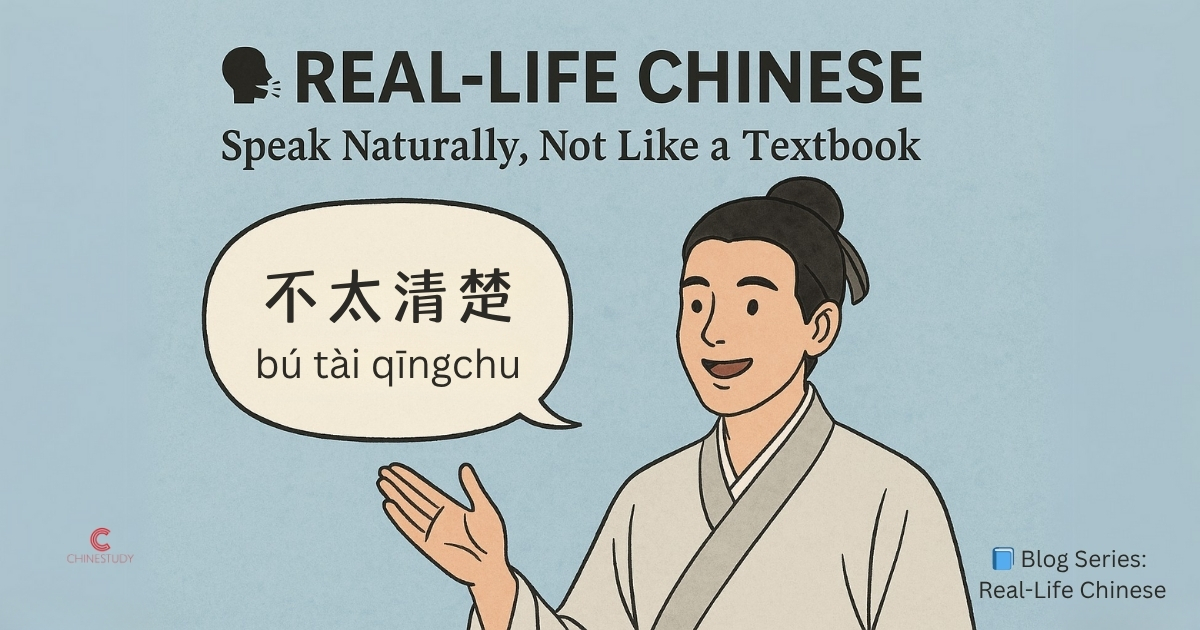How to Say “I Don’t Know” Like a Native — Not Just “我不知道”

Want to sound more native? Start here.
🚫 Textbook Chinese
我不知道 (wǒ bù zhīdào) – I don’t know
Yes, it’s correct.
But in real conversations, it can sound a little too blunt or dismissive — especially in casual or polite situations.
✅ Real Chinese
不太清楚 (bú tài qīngchu) – Not too sure / Not quite clear
This is what native speakers often say when they’re unsure.
It’s softer, more thoughtful, and leaves space for uncertainty.
🔍 Break It Down
- 不 (bù/bú) – not
- 太 (tài) – too / very
- 清楚 (qīngchǔ) – clear / clear understanding
So 不太清楚 literally means: “Not too clear.”
💡When to Use It
- 🤔 You’re not sure about an answer
- 💬 Replying politely to a question
- 📞 In messages, calls, or meetings
- 🤷♀️ Avoiding sounding too direct or uninterested
🧱 Example Sentences
1. - 你知道他去哪儿了吗?(Nǐ zhīdào tā qù nǎr le ma?)
👉🏻 Do you know where he went?
- 不太清楚。 (Bú tài qīngchu)
👉🏻 Not too sure.
2. - 这道题你会做吗?(Zhè dào tí nǐ huì zuò ma?)
👉🏻 Do you know how to solve this question?
- 不太清楚,要想一想。 (Bú tài qīngchu, yào xiǎng yi xiǎng)
👉🏻 Not quite sure. I need to think about it.
3. - 他们几点开会?(Tāmen jǐ diǎn kāihuì?)
👉🏻 What time is their meeting?
- 不太清楚,好像是三点? (Bú tài qīngchu, hǎoxiàng shì sān diǎn?)
👉🏻 Not sure… maybe 3 o’clock?
🤓 Why It Sounds Better
- More natural and polite — “不太清楚” feels softer than “我不知道”
- Adds nuance — It shows you might know a little, but not clearly
- Less final — Keeps the conversation open instead of shutting it down
- Common in real life — You’ll hear this everywhere: in chats, meetings, and messages
⚠️ Common Mistake
❌ Saying: 我不知道 (wǒ bù zhīdào)
👉 It can sound too flat, disinterested, or even abrupt in everyday speech.
✅ Say: 不太清楚 (bú tài qīngchu)
👉 It sounds softer and more thoughtful — great for polite, casual, or uncertain replies.
🏆 Quick Practice
Q: Your friend asks, “Do you know where she went?”
What’s the more natural reply in Chinese?
A. 我不知道 (wǒ bù zhīdào)
B. 不太清楚 (bú tài qīngchu)
✅ Correct Answer: B — It’s the friendlier and more natural choice.
✨ Final Thoughts
If you want to sound more thoughtful and natural in Chinese, try using 不太清楚 (bú tài qīngchu) instead of the textbook-style “我不知道.”
It’s softer, more polite, and very common in real life.
👉 Try it next time you’re unsure — in a message, chat, or casual conversation.
📘 Want more like this? Check out the full blog series: Real-Life Chinese
Thank you for subscribing!
Have a great day!